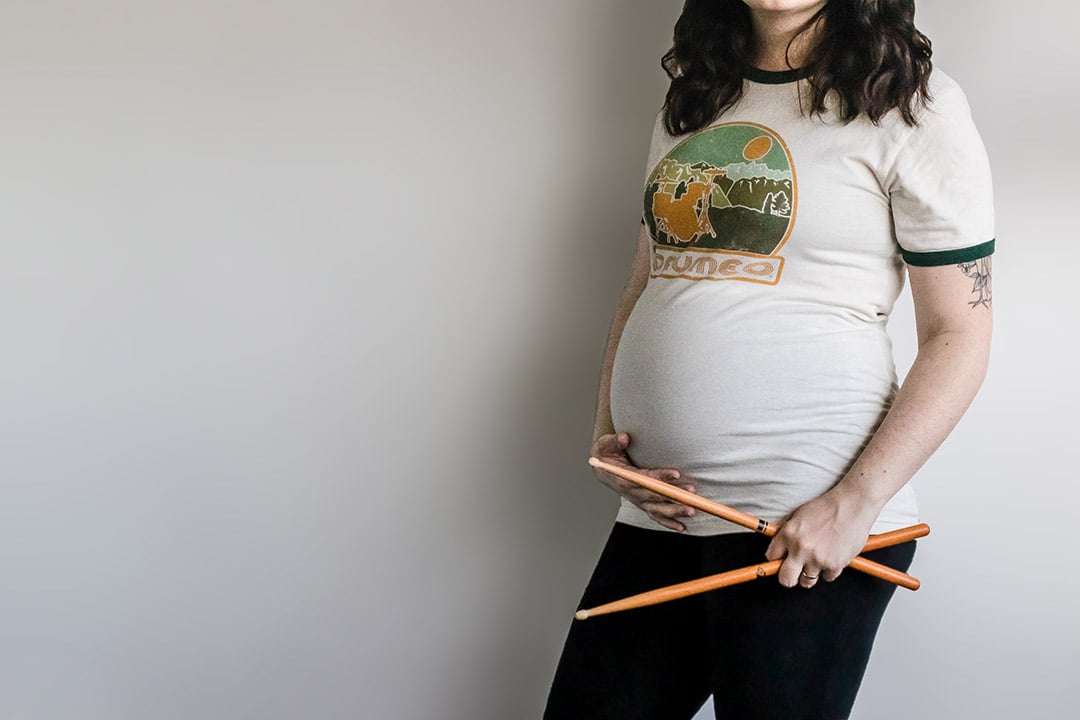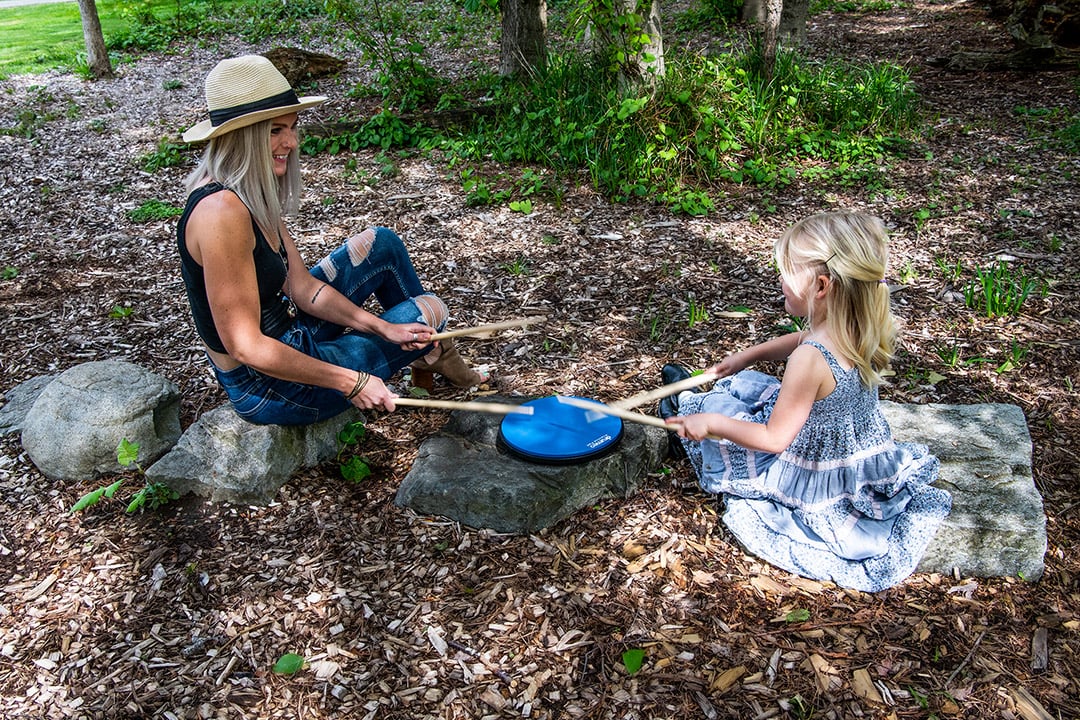
There are two kinds of drummer moms:
1. Moms of drummers (whom we love and are eternally grateful for, especially those who let us play drums under their roof or who have come to our gigs)
2. And moms who are drummers.
While not everyone is endowed with ‘cool parents’, there are many of them in this world. Whether you’re a drummer mom or you have an awesome one in your life, this article outlines what it’s like to be one and how pregnancy and parenthood has affected their playing.
(Note: Most of these women interviewed for this article were drummers before they were moms, but there are many out there who picked up the drums later. Both are awesome!)
Pregnancy takes a major toll on your body, and while it probably doesn’t stop many musicians from doing their thing, drums are loud and can take a lot of energy to play. Should drummers take time off when pregnant?
Speaking to a dozen drummer moms, they each took a slightly different approach during those nine months. Some didn’t put down the sticks and only made changes to their playing volume or setup, but others stopped drumming altogether.
Anaïs kept it up until her belly got too big, but until then, she put mesh heads and triggers on her kit and used rubber cymbals to keep the volume low. One of her personal concerns was “if they can hear your voice, they can hear a loud snare.” And as a drummer who uses a double pedal, “it hurt my lower back if I played too long. It never did that before.”
Serena kept touring and practicing until a day or two before her daughter was born. “My physician – and later midwife – wasn’t concerned with the volume or vibrations. Babe was dancing in there during shows, which could be a little tricky, as was the shift in balance as the tummy grew.” Nicole has been drumming since childhood and had a similar experience with both of her pregnancies, gigging pretty much until the 11th hour. The only real change she made was to stop carrying her 100 lb trap case.

Brooke was the only drummer at her church, so she kept playing every Sunday until she had to be induced. “As a drummer who was still learning and didn’t play very heavily, the only thing I changed was switching out my stool for a comfy choir chair with a back.”
And Deb, who was marching tenor drums for a senior drum and bugle corps, found out she was pregnant at the beginning of competitive season, and decided to continue “without telling anyone what was going on. Physically, I was worn out more and had troubles with my sciatica, but was still able to perform at a high level.”
On the other hand, Chelsea took a hiatus. “I heard it wouldn’t be harmful for hearing, but it was the exercise component that worried me. Plus the environment of our jams – smoking and drinking – was difficult for me to face without stressing. I didn’t even practice during pregnancy. I just set my sights on motherhood.”
Emily’s band didn’t have any upcoming shows, recordings, or tours booked, so she didn’t feel obligated to practice regularly. However, “about halfway through the pregnancy, I developed something called SPD (Symphysis Pubis Dysfunction), which caused a lot of pain in my pelvis, so I put my drumming on hold.”
Takeaway for moms: Do what’s best for you. If drumming makes you uncomfortable or worried, it’s fine to take the time off. Otherwise, you should be able to keep going – but you should clear it with your doctor.
Dr. James Lilja is a gynecologic oncologist based in the Bay Area, California. Coincidentally, he’s also the drummer of the band Bunko and a founding drummer of The Offspring. Dr. Lilja was asked if drummers should take a break or make any changes to their routine when pregnant.
“It’s absolutely safe for women to keep drumming during pregnancy. It’s also a great way to get your heart rate up. Like any form of exercise, make sure you don’t have a heart problem before doing it. Talk to your doctor. Your vascular system changes a lot during pregnancy, such as increasing the amount of blood in your system up to 48%. Sometimes health conditions are uncovered during pregnancy. The risk of blood clots is higher as well, so it’s recommended that you keep exercise going.
“Drumming is a great form of low impact exercise. Depending on your style, you’re likely sitting in a fixed position and moving your arms and legs vigorously. It’s like being on an exercise bike. It’s safe to keep playing – you aren’t going to be falling off your drums when your center of balance starts to change – but the range of motion of your legs will be different in your third trimester. Joints can have some problems as a result of pregnancy-related changes, and it’s not uncommon for back pain or knee pain to develop. See what feels comfortable for you, and have someone carry things for you after the second trimester.”
Out of the drummers interviewed for this article, one of the most common concerns was if drumming on an acoustic kit at full volume would be harmful for an unborn baby’s ears. Dr. Lilja compares the womb to ten inches of water that absorbs most of the sound from the outside world. “You could literally immerse your head in a bucket of water and have someone playing drums next to you. Even if you just filled your ears with water, you wouldn’t hear much because your tympanic membrane wouldn’t be vibrating like it normally would. Our eardrums aren’t evolved to vibrate inside water, and lots of sounds bypass the eardrums to go through bone.” Cities themselves can be loud outside, he adds, and there is no difference in the hearing of city kids.
Takeaway for moms: Playing drums while pregnant is a great way to exercise and the noise is unlikely to harm the baby’s ears. Have someone else carry your gear in the third trimester and only do what you’re comfortable with.
*This is one expert’s opinion and we recommend you still consult your own physician to determine what’s best for your individual needs.
Drumming comes with a million advantages, including being good for mental and physical health. But it also takes time and energy, two things that new moms rarely have. How quickly can someone get back to drumming if they want to?
Moms might want to pick up a set of electronic drums. “The last thing any new parent wants is to wake your baby up unnecessarily,” says Dr. Lilja. He also suggests sharing a workout schedule with your obstetrician. “Set up a flexible daily goal for exercise, and anticipate interruptions, which is where drumming can come in. If you have an electronic kit set up, you can use that to play a fairly energetic song set for about half an hour and get it in when you put your baby down for a nap. It’s already there, you like playing it, and you can burn about 200-250 kCal if you play hard for that half hour. New moms are pretty fatigued. It takes an enormous amount of emotional and physical energy to grow and deliver a baby, and then you get to go home and not sleep. It would seem that drumming might be an ideal way to do something just for you…that is, depending on how delivery went.
“When you get home, it may not feel great to drum sitting upright on your throne. Maybe you’ve had some tears or an episiotomy during delivery, or it’s just swollen and uncomfortable to sit. If you are really driven to play, you might consider putting down a foam donut to take pressure off sensitive areas. It may even take several weeks to feel better. If you’ve had a C-section, the usual advice is to not heavy lift for about six weeks. However, unless you’re playing speed metal and pounding away with both legs and arms, you’re probably not putting enough pressure on the incision to match lifting 20 pounds. You just might be too damn sore to want to do it.”
The length of the recovery period seems to vary from person to person. Nicole got back to teaching drums at a school within two weeks, and Sara started drumming again after six weeks.

It was almost a year before Emily could get back on the kit due to a long recovery from an unplanned C-section and lingering pain from her SPD. “The first session back behind a real acoustic kit was something else; the things I expected to struggle with, I didn’t, and the things I expected wouldn’t change became very challenging!” For other moms who’d had emergency C-sections, one was back to practicing two weeks later, while another took two months off.
Making the transition from solo drummer to ‘drumming for two’ isn’t easy, especially for those dealing with postpartum depression. “I received some therapy while struggling with PPD and anxiety, and they really encouraged me to get back to my passion,” says Chelsea. “So around four months postpartum, I began practicing occasionally in a rehearsal studio and on my practice pad during naps. I think drum practice helped me to reprioritize my life for the better, and helped me regain confidence lost while adjusting to my new responsibilities. Getting back in the groove of drumming and learning new things helped me move forward instead of reflecting on my old life or the idea that my goals were left unattained. About six months after that, my friends asked me to join their band.”
Takeaway for moms: It could be weeks or months postpartum before you’re ready to get back on the kit, but everyone is different. Drumming is great for physical and mental health, so if you can make time to keep it up, the benefits will be worth it.
For moms who took up drumming when their kids were older, this probably isn’t as much of an issue. But for new moms, or parents of young children, balancing your own practice or gig routine with raising a family isn’t easy. Cordelia took two years off work and didn’t play her drums for almost seven years. “But I’m back on them now at the age of 46 and gigging again.”
Emily’s story might be familiar to anyone who’s tried to maintain a hobby or passion with a baby at home. She lives in a rural area and jams in a detached garage, so during naps “I can wail away without it being a disturbance. I’m sure any parent reading this will agree that even a squeaky floorboard can wake up some kids, so the thought of having a kit in the house – even an electric one – was not a long-term plan for me.
“Balancing anything in conjunction with a new baby is challenging, but they do generally have routines so that is helpful. Though it’s always on the days you’re planning a major session that they decide they aren’t taking a nap!”
On top of scraping together any free time she has, Emily finds it challenging to have enough energy sometimes. “There is an immense physical demand that comes with playing drums, and after sleeping for four hours a night three nights in a row, it can be tough to find the energy to lift those sticks.”
“All great things take time and energy, children and drumming alike. I’ve learned to become ‘flexibly inflexible’. By that, I mean that you may plan to practice, or record, or hit your weekly goal, but kids aren’t robots and certainly don’t adhere to your plans, so you have to get used to winging it and putting in the time when you have it. Just go one day at a time; it puts less pressure on meeting expectations that may now be unrealistic.”
While Emily has experienced the challenges of playing drums with a newborn, Juliana took up drumming when her son was almost two years old. He was already walking and would watch his mom practice. He then started playing the drums as well. She had a studio at the time and gave him headphones to use. “I wasn’t working, so I had all the energy I needed to learn. If you have other people around you who can help you take care of your child, or if you can wait until you have time, that makes it easier. Maybe you can learn together!”
Whether it’s noise concerns, the inability to lift heavy items, or the reality of not having enough time or energy, there are a million things that can make being a drummer mom even more difficult than the act of learning the drums itself. But these moms have persevered and found ways to make it work. And for this, we salute you!
Samantha Landa currently drums with Conquer Divide and has been featured by outlets such as Sick Drummer Magazine and DRUM! Magazine. Sam proudly endorses Mapex Drums, Sabian Cymbals, Evans Drumheads and Los Cabos Drumsticks.


By signing up you’ll also receive our ongoing free lessons and special offers. Don’t worry, we value your privacy and you can unsubscribe at any time.
We use cookies for traffic data and advertising. Cookie Policy »